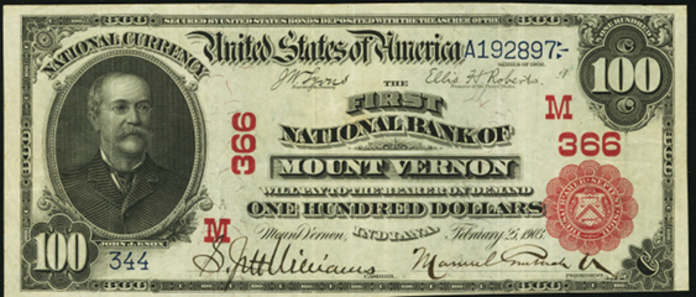One Hundred Dollar Notes › Nationals › 1902 One Hundred Dollar National Bank Notes › South Carolina Charters › 1902 $100 Union South Carolina Citizens National Bank
Get Value Now
| Item | Info |
|---|---|
| Series | 1902 |
| Charter | #9742 Citizens National Bank of Union, South Carolina |
| Year Chartered | 1910, 291 Banks Chartered |
| City Info | The city of Union is the county seat of Union County, South Carolina, United States. The population was 8,393 at the 2010 census. It is the principal city of the Union Micropolitan Statistical Area, an which includes all of Union County and which is further included in the greater Greenville-Spartanburg-Anderson, South Carolina Combined Statistical Area. Source: Wikipedia |
| Similar Cities | 39 banks with similar city. First 12 below: 1. Union Mills, Union City, Pennsylvania - First National Bank 2. Uniontown, Pennsylvania - First National Bank 3. Union Springs, New York - First National Bank 4. Uniontown, Pennsylvania - National Bank of Fayette County 5. Union City, Indiana - First National Bank 6. Union City, Michigan - Union City National Bank 7. West Union, Iowa - Fayette County National Bank 8. Union, South Carolina - Merchants and Planters National Bank 9. Union City, Michigan - Farmers National Bank 10. Union, Oregon - First National Bank 11. Unionville, Missouri - Marshall National Bank 12. Unionville, Missouri - National Bank of Unionville |
| Seal Varieties | Red, Blue |
| Other Info | 1. Value depends on notes known for charter, condition and market demand. |
| Neat Fact | Plain Backs issued in sheets of 2 Notes: 1 $50 Note & $ $100 Note (Friedbergs, 20th Ed. P137) |
No Obligations Offers and Appraisals
Please submit a good photo or scan. It will be identified and evaluated. Understand there may be subtle differences between the image you see above and your note. Signatures, design, markings and note condition will determine the offer price. Notes in Uncirculated or better condition receive the best offers.
Appraisals can be estimated for wholesale and retail prices. Wholesale is what dealers typically pay. Retail is what a collector might pay. Retail is slightly higher in most cases.
Please visit this page for USA Paper Money Reference. Do not treat this page as a reference guide, it is for appraisal and acquisition purposes only.
